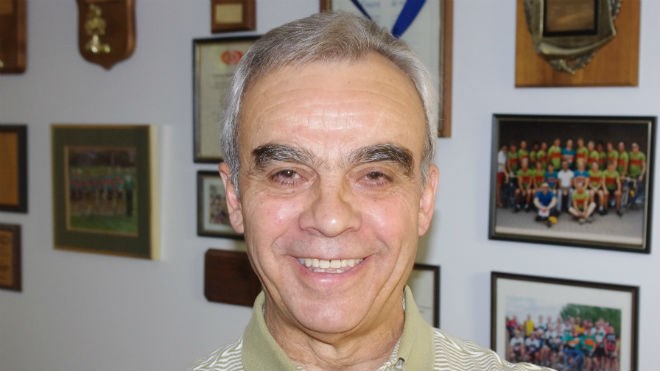Born in Italy, Muredda moved to Canada at 18, initially to Red Lake before finding work in Sudbury in the early 1970s. While Red Lake had no semblance of a cycling community, Sudbury, at least, provided a starting point.
"When I started to go out, I met other riders, Italian people who used to race in the old country, and that's really how the club got started," said Muredda.
Joining forces with the likes of Carlo Valduga, Gianfranco Roncino and Leo Fantasia, the original brain trust shared their hopes of growth for the SCC as the Nickel City prepared to host the Ontario Summer Games for the first time in 1974.
"We thought that it was a shame that the Games are in Sudbury and we have nobody from Sudbury entered in the cycling competition," Muredda recalled. "So we asked some of the kids from the neighbourhood, gathered about eight or nine of them, trained for two months and cleaned up at the Ontario Summer Games."
That initial grouping, which included a few who went on to success on a provincial and national scale, also introduced future Olympian Gary Trevisiol to the sport. In fact, from 1980 through 2000, the SCC would lay claim to continually being in the mix when it came to the national cycling team and the Olympic dreams of young riders.
Both David Spears (1992) and Eric Wohlberg (1996/2000) would follow in Trevisiol's footsteps, in what was surely the heyday of the SCC in terms of producing elite talent.
"You could tell all three of them were special right away," said Muredda, who has remained a coaching constant through four decades.
"Gary because of his natural ability. That guy was an animal. He was strong in every aspect of the game, and feared nobody. Spears was all about pure dedication. He maybe did not have the pure ability that Gary had, but he was in love with the sport.
"Eric only started with us at 21 years old. I remember the first time I saw him race in Gatchell. He came out with our riders and I'm seeing this kid that is hanging on with my riders.
"I told my guys to attack him, one at a time, to get rid of this guy," Muredda said. "They couldn't lose him."
Fast forward to 2014, and while SCC membership remains solid with more than 40 active cyclists, the environment has changed, with only three current riders under the age of 25.
"It is much better when there's a lot of youth involved," said Muredda. "For me, I'm dedicated to the sport and I will do it even now, writing training plans for them even if they're 40, 45, 50 years old. But when we had the youth, to me, that was better. As a club, we are a feeder to the provincial team, to the national team.
"When you see a kid who comes in with a Canadian Tire bicycle and he finally gets to where he wins a provincial championship, or a national, that's an honour for the coach, that's an honour for the club."
With cycling acknowledged as one of those sports where a certain amount of discomfort is inherant with the rigorous training needed to rise to the elite level, Muredda ponders the lack of young riders.
"Maybe the kids are not willing to suffer as much," he said. "Maybe they want the easy way now, I'm not sure. Cycling is a lot of hard work, a lot of commitment, a lot of travelling."
Through it all, however, the winning recipe has not changed drastically. Forty years later, bike handling skills are key.
"You have to be able to corner properly, to be able to ride in a group, to know how to change gears and have the proper cadence," said Muredda. "And, of course, positioning on the bike is key."
Greater involvement recently from triathlon enthusiasts, most of whom come from either swimming or running backgrounds, has provided another core of athletes Muredda can groom, providing a more stable base to the SCC.
"There are always peaks and valleys," Muredda said. "There were times when there were maybe only four to five riders in the club. The next year, we would build up again. Honestly, I didn't think it would last this long."
Forty years, to be precise.
Join Sudbury.com+
- Messages
- Post a Listing
- Your Listings
- Your Profile
- Your Subscriptions
- Your Likes
- Your Business
- Support Local News
- Payment History
Sudbury.com+ members
Already a +member?
Not a +member?
Sign up for a Sudbury.com+ account for instant access to upcoming contests, local offers, auctions and so much more.
